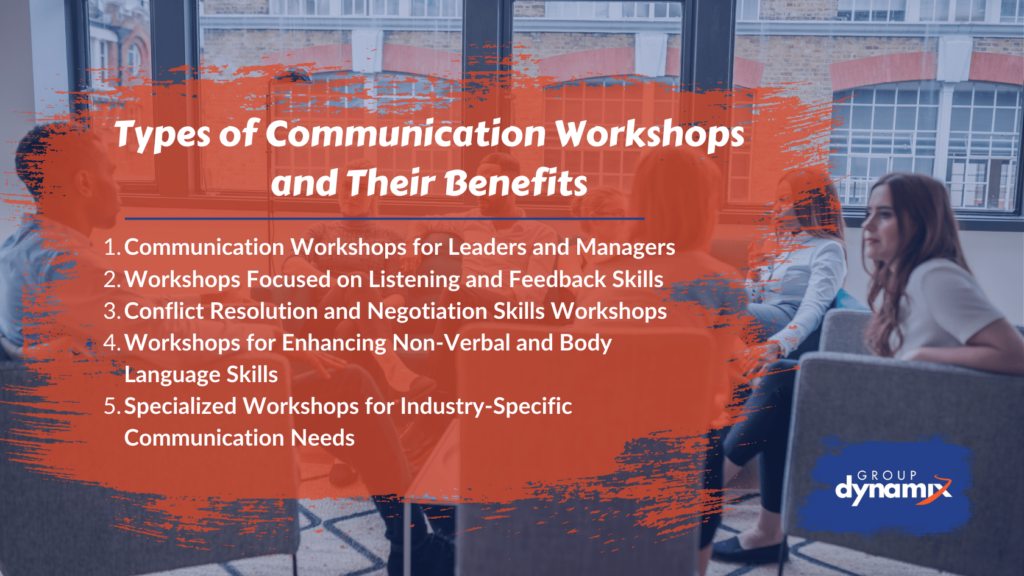Whether you’re leading a team, managing projects, or collaborating with colleagues, strong communication can make the difference between thriving and merely surviving in the workplace. I’ve seen firsthand how communication workshops transform workplace dynamics and elevate team performance, which is why I’m excited to share this comprehensive guide with you.
If you want to elevate your team’s communication skills, we encourage you to contact Group Dynamix. Our interactive workshops aim to promote collaboration and improve interpersonal dynamics within your team. Join us to experience a distinctive combination of enjoyment and learning that can result in lasting enhancements in how your team communicates and collaborates.
Benefits of Team Building
Benefits of Team Building

Why Are Communication Workshops Important?
The importance of communication workshops becomes strikingly clear when we look at current workplace challenges. According to recent studies, 40% of employees worldwide believe there is a lack of collaboration and communication in their company. This communication gap isn’t just a minor inconvenience—it’s affecting core business operations and team morale.
Effective communication workshops address these challenges head-on by providing structured, practical training that helps participants develop crucial interpersonal skills. What’s particularly concerning is that 28% of employees report poor communication as being the number one reason for not being able to meet deadlines, highlighting the direct impact on productivity and project success.
Communication skills training programs offer more than just theoretical knowledge—they create a safe space for practicing and refining essential skills. Through interactive communication training, participants learn to navigate complex workplace dynamics and build stronger relationships. This is particularly crucial given that 43% of on-site employees state that due to poor communication, they lose trust in leadership.
The real value of communication workshops lies in their ability to transform workplace culture. When team members learn to communicate effectively, they’re better equipped to handle conflicts, share ideas, and collaborate productively. With 33% of employees citing a lack of transparency in internal communications as a problem, these workshops provide the tools and techniques needed to bridge communication gaps and foster a more open, collaborative environment.
Key Components of Successful Communication Workshops
The success of effective communication skills training hinges on several key components that work together to create a transformative learning experience. I’ve found that the most impactful workshops incorporate these elements strategically to ensure participants gain practical, applicable skills they can use immediately in their professional lives.
Customizing Workshops for Diverse Audiences and Goals
A workshop on effective communication skills must be tailored to its audience to deliver meaningful results. What works for senior executives might not resonate with entry-level employees, and industry-specific challenges require unique approaches. When designing communication skills training topics, I focus on understanding the participants’ backgrounds, challenges, and objectives to create relevant content that addresses their specific needs.
The customization process involves:
- Conducting pre-workshop assessments to understand participant needs
- Adapting case studies to reflect industry-specific scenarios
- Modifying exercises to match the group’s experience level
- Aligning learning objectives with organizational goals
Incorporating Emotional Intelligence and Empathy in Training
Interpersonal communication skills workshops must go beyond basic communication techniques to include emotional intelligence training. This crucial component helps participants understand the emotional underpinnings of effective communication. By developing emotional awareness, participants learn to:
- Recognize and manage their own emotional responses
- Read and respond to others’ emotional cues
- Build stronger professional relationships
- Navigate difficult conversations with sensitivity
Interactive Elements: Role-Playing and Real-Life Scenarios
Interactive communication training is at the heart of successful workshops. Role-playing exercises and real-life scenarios provide participants with hands-on experience in applying new skills. These practical elements help bridge the gap between theory and application by:
- Simulating challenging workplace conversations
- Practicing active listening techniques
- Receiving immediate feedback from facilitators and peers
- Building confidence through repeated practice
Incorporating experiential learning into these workshops can elevate the effectiveness of communication training. Experiential learning is based on “learning by doing” and allows participants to engage directly with tasks and challenges in a supportive environment. By actively participating in team-building exercises, participants can develop essential skills that are crucial for effective communication, such as problem-solving and collaboration.
Experiential learning helps create a dynamic learning atmosphere where team members learn not only from the tasks at hand but also from each other. As they face obstacles together, they foster trust and strengthen their communication abilities by relying on one another’s strengths and insights. This collaborative approach mirrors real-world scenarios, helping participants transition smoothly from theory to practice by applying new communication strategies in safe, low-stakes situations.
The benefits of integrating experiential learning into communication workshops are numerous:
- Active Engagement: Participants are fully involved in hands-on activities, ensuring that they are not passive learners but instead actively investing in their development.
- Immediate Feedback: Participating in structured activities allows team members to receive real-time feedback, enabling them to reflect and identify areas for improvement on the spot.
- Skill Development: By applying communication skills directly in interactive settings, participants can solidify their learning and see tangible results, further enhancing their confidence.
- Strengthened Cooperation: Working together to tackle challenges cultivates collaboration and reinforces the importance of effective communication within a team.
- Trust Building: Experiential learning activities create an environment where team members can build trust through shared experiences, ultimately enhancing team cohesion and readiness to communicate openly.
Incorporating experiential learning into communication training workshops not only reinforces key skills but also makes the process engaging and enjoyable. Through these hands-on experiences, participants will leave with a deeper understanding of communication dynamics, ultimately fostering stronger, more cohesive teams prepared to navigate the complexities of workplace interactions.

Types of Communication Workshops and Their Benefits
The landscape of communication workshops has evolved significantly, with the communication training market expected to grow at a CAGR of 14.1% by 2032. This growth reflects the increasing recognition of effective communication as a crucial workplace skill. Let me break down the various types of workshops and their specific benefits.
Communication Workshops for Leaders and Managers
Leadership-focused communication workshops address the unique challenges faced by those in management positions. These specialized communication training programs help leaders:
- Develop a commanding yet approachable communication style
- Master the art of delivering clear directives and expectations
- Create an environment that encourages open dialogue
- Build trust through transparent communication
The emphasis here is on helping leaders become communication role models within their organizations, as their communication style often sets the tone for the entire team.
Workshops Focused on Listening and Feedback Skills
Effective communication workshops that focus on listening and feedback are fundamental to any interpersonal skills training program. These sessions help participants:
- Master active listening techniques
- Develop empathetic response patterns
- Learn to provide constructive feedback
- Understand the impact of their communication style on others
These workshops are particularly valuable because they address both sides of the communication equation – sending and receiving messages effectively.
Conflict Resolution and Negotiation Skills Workshops
Communication workshops for employees often include conflict resolution and negotiation components, as these skills are crucial in today’s collaborative work environment. These sessions focus on:
- Understanding conflict triggers and patterns
- Developing win-win negotiation strategies
- Managing difficult conversations professionally
- Building consensus across diverse perspectives
Workshops for Enhancing Non-Verbal and Body Language Skills
Non-verbal communication makes up a significant portion of our daily interactions. These specialized workshops help participants:
- Align body language with verbal messages
- Interpret others’ non-verbal cues accurately
- Project confidence through posture and gestures
- Use facial expressions effectively
- Master vocal tone and pitch for maximum impact
Specialized Workshops for Industry-Specific Communication Needs
Different industries require different communication approaches. These tailored communication training programs address:
- Industry-specific terminology and jargon
- Regulatory compliance communication
- Technical information presentation
- Client-facing communication protocols
The beauty of these specialized workshops lies in their ability to provide immediately applicable skills within specific professional contexts, making the learning more relevant and practical for participants.
Engaging Company Events
Corporate Events, Group Outings, Private Events, Charities, Meetings, and More...
Engaging Company Events
Corporate Events, Group Outings, Private Events, Charities, Meetings, and More...
Conclusion
In conclusion, communication workshops are not just beneficial; they are essential for fostering a cohesive, effective, and productive workplace culture. By addressing the critical issues of communication gaps, lack of collaboration, and emotional intelligence, these workshops equip team members with the skills necessary to thrive in today’s complex professional environment. The transformative impact of improved communication can lead to stronger relationships, enhanced teamwork, and ultimately, greater organizational success.
If you’re ready to take your team’s communication skills to the next level and create a more collaborative atmosphere, we invite you to reach out to Group Dynamix. Our engaging and tailored workshops are designed to meet your unique needs and help transform your workplace dynamics. Start your journey toward effective communication and team building today!

